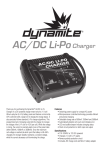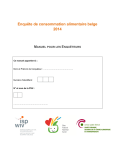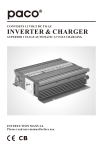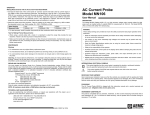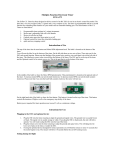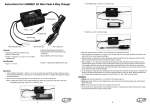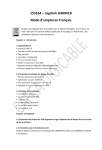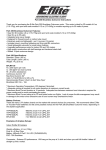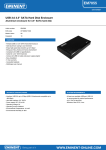Download Hotpoint Cell Phone Accessories DC 1-14 User's Manual
Transcript
Cycle Process (Charge After Discharge) Step 1. Push the Start/Select button twice and the Pinnacle will beep twice and will begin discharging the battery. The orange LED will remain on and the red LED will flash. This means the unit has begun the cycle mode—charge after discharge. Step 2. After the battery packs are discharged under constant voltage, the charger will beep once and advance to trickle mode for a short period of time. The orange LED will shut off and the green and red LED will flash. Step 3. The charger will beep again and advance into a fast charge mode and only the red LED will remain on during charging mode. Step 4. After charging is complete, re-peak once to check charging. Discharge Process Step 1. Push the Start/Select button three times and the unit will beep three times, indicating discharge mode. The orange LED will remain on. Step 2. The battery will start discharging at this point and the discharge current is dependent on the number of cells (6–7 cells will discharge at about 2–3 amps). Step 3. When the voltage drops below .9-volt per cell, the discharge process is complete and the unit will beep once and advance into trickle charge mode. Safety Precautions • Do not leave the battery and charger unattended while in use. • When charging, constantly monitor the temperature of the battery pack. If the battery becomes hot to the touch, discontinue the charging operation immediately by disconnecting the battery pack. • Do not allow children to charge battery packs unless supervised by a responsible adult. • The charger can become hot during charging. Use care when selecting where you will charge the battery packs. Warranty and Repair Policy The Pinnacle™ charger is guaranteed against workmanship and manufacturing defects for a period of 2 years from the original date of purchase. This warranty is limited to the original purchaser of the charger and is not transferable. Warranty repair will not cover units that have been modified, misused or serviced by an unauthorized service center. To speak to a service technician, call (217) 355-9511. If your charger needs to be repaired, ship the charger in its original box (freight prepaid) to: Horizon Service Center Attn: E-flite™ Service Center 4105 Fieldstone Rd. Champaign, IL 61822 Include your complete name and address information inside the carton, as well as clearly writing it on the outer label/return address area. Include a brief summary of the difficulty. Date your correspondence and be sure that your name and address appear on this enclosure. Also, please include a phone number where you can be reached during the business day. Warranty Repairs To receive warranty service, you must include your original sales receipt verifying the proof-of-purchase date. Providing that warranty conditions have been met, your charger will be repaired free of charge. Non-Warranty Repairs Should your repair cost exceed 50% of the retail purchase cost, you will be provided with an estimate advising you of your options. Any return freight for non-warranty repairs will be billed to the customer. For non-warranty repairs, please advise us of the credit card that you prefer to use. Horizon Service Center accepts Visa or MasterCard. Include your card number and the expiration date. Horizon Service Center also accepts money orders. 5610 ©2003 Horizon Hobby, Inc. Printed in Taiwan www.horizonhobby.com Pinnacle™ DC 1–14 Cell Variable Rate Peak Prediction Charger Instructions Thank you for purchasing the E-flite™ Pinnacle™ Peak Prediction Charger. The Pinnacle is DC-powered and will peak charge and discharge 1–14 (1.2–16.8V) cell Ni-Cd and Ni-MH battery packs. It features a 16-bit microchip CPU controller with a large LCD display indicating capacity, voltage and charge rate. The Pinnacle’s unique peak prediction circuitry ensures that your batteries receive an accurate charge every time and protects your Ni-Cd and Ni-MH batteries from the dangers of over charging. The Pinnacle does this by continuously monitoring the battery’s voltage curve and calculates (predicts) when the peak (100% charge) will occur. When the batteries have peaked, the Pinnacle stops fast charging at exactly that point and then advances to trickle mode. This is essential in order to avoid damaging Ni-Cd and especially Ni-MH cells that are sensitive to over charging. This circuitry is superior to conventional peak detection circuitry which continues to fast charge even after the batteries are fully charged, which may cause damage to Ni-Cd and Ni-MH cells. Features • Superior peak prediction circuitry ensures maximum battery life • High-efficiency direct current/rising voltage exchange mode minimizes heat output • Large LCD displays indicates mAh, voltmeter, and ammeter • LCD shows number of cells during charging process • DC fan for efficient cooling • LED display with three color functions indicates charge, discharge and trickle modes • Reverse polarity protection • Push-button Start • Charge beeper indicates charge is complete • Banana plugs with alligator clips adapter included • Receiver, transmitter, BEC- and Tamiya-style charge leads included Specifications • 12V DC-powered • Charges, trickle charges and discharges 1–14 cell packs • Ni-Cd and Ni-MH compatible • Voltage booster to DC 28V • 7.5-amp fuse safety circuit • Variable charge rates: 200mA–5000mA (13- and 14-cell packs may not reach 5000mA) • 16-bit processor with high-resolution displays features Step 2. Attach the black (negative) banana plug to the black (negative) terminal. Alligator clip adapters are also provided if you choose to power your charger with a 12V hobby battery. Once your charger is given power, it will beep once and the LCD will show 28V, which is normal. Choosing Charge Leads The Pinnacle includes several charge lead options to best suit your application. • A BEC-style charge lead is included for charging slow and park flyer packs with a BEC (JST) connector. • A Tamiya-style charge lead is also included to charge those packs that have this connector, popular on electric gliders, cars and boats. • A universal receiver charge lead is included for charging all of the major brands of receiver battery packs. • A transmitter charge lead is included to charge transmitters without removing the battery from the unit. Follow the procedure noted below in Step 1 and Step 2, except when charging JR transmitters. Note: When charging JR transmitters it will be necessary to reverse the polarity of the charge jack by plugging the end of red lead into the black of the charger hook-up and plug the end of the black lead into the red of the charger hook-up. Failure to do so may result in damage to your transmitter. Step 1. Hook up the end of the leads to the terminal of the charger, making sure that you attach the red of the lead wire to the red of the charger hook-up. Step 2. Next, attach the black of the lead wire to the black of the charger hook-up. Step 3. Plug the connector of the charge lead into the connector of the battery pack. The beeper will sound once and the LED light will flash green. Please observe polarity when attaching the leads to the charge output. Charging Process Step 1. Push the Start/Select button once. You will here a beep and the red light will quickly flash to indicate fast charge condition. You can use the charge rate adjustment knob to select the appropriate charge rate. Step 2. Select the charge rate for charging your battery pack. Note: Refer to the chart below for recommended charge rates. The LCD readout will correspond to the current/voltage. After 30 seconds the red light will stay on and no longer flash. Functions/LCD Screen Readings Note: Do not adjust the charge rate knob in this state. Operation Push Once Push Twice Push Three Times Connect Battery Without Pushing Push One More Time After Action LED Condition/Beep Red/Beep Once Orange & Red/Beep Twice Orange/Beep Three Times Green Green Function Fast Charge Cycle (Charge After Discharge) Trickle Charge (150 mA) Trickle Charge (150 mA) Return to Trickle Charge Error Modes The Pinnacle features a self-diagnostic mode with the following error codes: • “ERR1”...... a short circuit or the safety fuse is burned out • “ERR2”...... an error has occurred in the charging process (loose connection, contacts or current is adjusted after the initial 30 second start up mode) • “ERR6”...... the Peak charge is abnormal because the voltage is too low • “ERR”........ the power supply is insufficient (below 10V) To cancel error modes, disconnect the batteries from the charger. Supplying DC Power to the Pinnacle The Pinnacle is powered by connecting it to a 12V power source, such as a 12V sealed battery (HAN102), a 12V automobile battery (car must be not be running) or through your field box power panel. The battery capacity must be over 5Ah. Step 1. Attach the red (positive) banana plug to the red (positive) terminal on your 12V battery or power panel. Step 3. While charging, the red light will remain on. If you adjust the current in this state, the charging process will stop and shut down. The error code “ERR2” will display. Step 4. When charging is complete, the charger will beep ten times and the LED flashes green. The charger is now in trickle charge. The beeper will sound once every few minutes until the battery is disconnected. Step 5. Push the Start/Select button to process any further charge function if necessary. Step 6. To re-peak the pack, simply push the Start/Select button. This must be done without disconnecting the battery pack. The beeper will sound once, and the pack will charge until it peaks. It will then return to trickle charge. Battery Capacity 150–270 mAh 350–500 mAh 550–800 mAh 850–1200 mAh 1500–2000 mAh 2400 and above Charge Rate 0.5 amps 1.0 amps 1.5 amps 2.5 amps 4.0 amps 5.0 amps Typical charge time 18–32 minutes 21–30 minutes 22–32 minutes 20–31 minutes 22–30 minutes 28 minutes + Note: Due to variables such as internal resistance of certain cells and power supply, some 13- and 14-cell packs may not charge at 5 amps. Note: Charging 8-cell transmitter batteries in the transmitter must be set at 1 amp or less to avoid damage to the transmitter or flowing the fuse.


